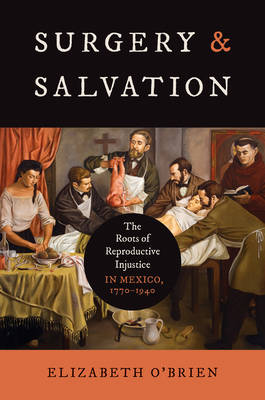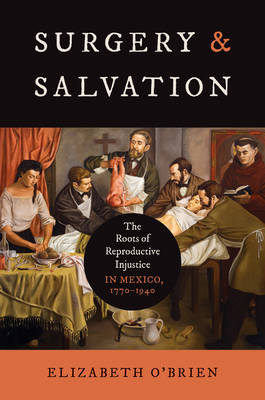
- Afhalen na 1 uur in een winkel met voorraad
- Gratis thuislevering in België vanaf € 30
- Ruim aanbod met 7 miljoen producten
- Afhalen na 1 uur in een winkel met voorraad
- Gratis thuislevering in België vanaf € 30
- Ruim aanbod met 7 miljoen producten
Zoeken
€ 167,95
+ 335 punten
Uitvoering
Omschrijving
In this sweeping history of reproductive surgery in Mexico, Elizabeth O'Brien traces the interstices of religion, reproduction, and obstetric racism from the end of the Spanish empire through the post-revolutionary 1930s. Examining medical ideas about operations (including cesarean section, abortion, hysterectomy, and eugenic sterilization), Catholic theology, and notions of modernity and identity, O'Brien argues that present-day claims about fetal personhood are rooted in the use of surgical force against marginalized and racialized women. This history illuminates the theological, patriarchal, and epistemological roots of obstetric violence and racism today.
O'Brien illustrates how ideas about maternal worth and unborn life developed in tandem. Eighteenth-century priests sought to save unborn souls through cesarean section, while nineteenth-century doctors aimed to salvage some unmarried women's social reputations via therapeutic abortion. By the twentieth century, eugenicists wished to regenerate the nation's racial profile, in part by sterilizing women in public clinics. The belief that medical interventions could redeem women, children, and the nation is what O'Brien refers to as "salvation though surgery." As operations acquired racial and religious significances, Indigenous, Afro-Mexican, and mixed-race people's bodies became sites for surgical experimentation. Even during periods of Church-state conflict, O'Brien argues, the religious valences of experimental surgery manifested in embodied expressions of racialized, and often-coercive, medical science.
O'Brien illustrates how ideas about maternal worth and unborn life developed in tandem. Eighteenth-century priests sought to save unborn souls through cesarean section, while nineteenth-century doctors aimed to salvage some unmarried women's social reputations via therapeutic abortion. By the twentieth century, eugenicists wished to regenerate the nation's racial profile, in part by sterilizing women in public clinics. The belief that medical interventions could redeem women, children, and the nation is what O'Brien refers to as "salvation though surgery." As operations acquired racial and religious significances, Indigenous, Afro-Mexican, and mixed-race people's bodies became sites for surgical experimentation. Even during periods of Church-state conflict, O'Brien argues, the religious valences of experimental surgery manifested in embodied expressions of racialized, and often-coercive, medical science.
Specificaties
Betrokkenen
- Auteur(s):
- Uitgeverij:
Inhoud
- Aantal bladzijden:
- 336
- Taal:
- Engels
- Reeks:
Eigenschappen
- Productcode (EAN):
- 9781469675862
- Verschijningsdatum:
- 14/11/2023
- Uitvoering:
- Hardcover
- Formaat:
- Genaaid
- Afmetingen:
- 156 mm x 234 mm
- Gewicht:
- 693 g

Alleen bij Standaard Boekhandel
+ 335 punten op je klantenkaart van Standaard Boekhandel
Beoordelingen
We publiceren alleen reviews die voldoen aan de voorwaarden voor reviews. Bekijk onze voorwaarden voor reviews.








